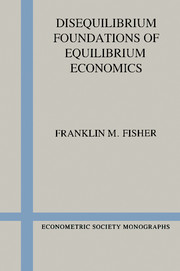Book contents
- Frontmatter
- 1 Introduction: Disequilibrium analysis and the theory of value
- Part I Methods and Problems of the General Equilibrium Stability Literature
- Part II A Model of Disequilibrium with Arbitraging Agents
- 4 Allowing disequilibrium awareness
- 5 The theory of the individual agent
- 6 Transaction difficulties, individual price offers, and monopoly power
- 7 Walras’ Law and the properties of equilibrium
- 8 Dynamics and stability
- 9 Concluding thoughts
- Appendix: Mathematics of stability
- References
- Index
9 - Concluding thoughts
Published online by Cambridge University Press: 05 January 2013
- Frontmatter
- 1 Introduction: Disequilibrium analysis and the theory of value
- Part I Methods and Problems of the General Equilibrium Stability Literature
- Part II A Model of Disequilibrium with Arbitraging Agents
- 4 Allowing disequilibrium awareness
- 5 The theory of the individual agent
- 6 Transaction difficulties, individual price offers, and monopoly power
- 7 Walras’ Law and the properties of equilibrium
- 8 Dynamics and stability
- 9 Concluding thoughts
- Appendix: Mathematics of stability
- References
- Index
Summary
This investigation has come some distance from its origins in the traditional stability literature. Unfortunately, there is still a long way for further research to go before we have a sound foundation for equilibrium economics. I now review some of the road traveled and then consider the nature of the road ahead.
We now know that, under very general circumstances, in a world of rational agents who perceive and act upon a nonexpanding set of arbitrage opportunities cast up by disequilibrium, the economy will be driven to equilibrium as such opportunities disappear. This will occur if new opportunities in a wide sense do not continue to appear or to be perceived to appear. In fact, stability is achieved even with new opportunities, provided that such new opportunities do not appear as favorable surprises, seized by agents as optima the moment they appear. This result - while not nearly as helpful as would be a parallel result as to the effects of the nonappearance of new exogenous opportunities - is nevertheless a basic waystation. It holds both for competitive economies and for some economies including monopoly or monopolistically competitive elements.
This general (if weak) stability result is free of many of the problems which flawed the earlier literature. Consider first the tâtonnement literature. There, to obtain stability it was necessary to restrict excess demand functions very severely; no such restriction is required in the present context. Further, the entire setting of tâtonnement was unrealistic, requiring the absence of any disequilibrium activity save price adjustment with continual recontracting. That is plainly not the case here.
- Type
- Chapter
- Information
- Disequilibrium Foundations of Equilibrium Economics , pp. 212 - 218Publisher: Cambridge University PressPrint publication year: 1983



